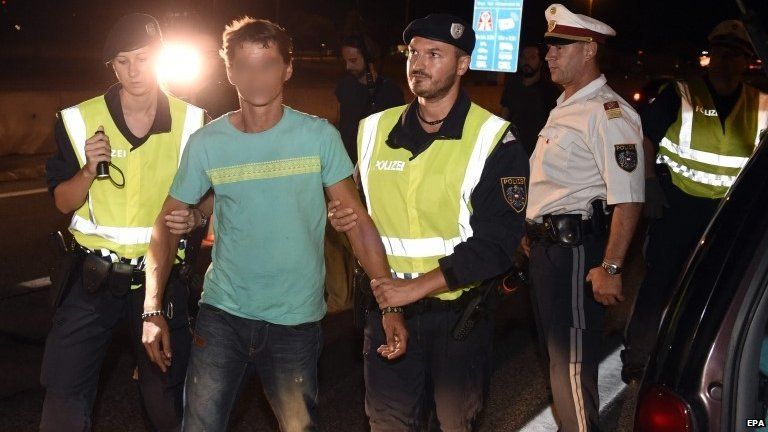Migrant crisis: Austria holds suspected people smugglers
- Published
- comments

Austrian authorities have arrested five suspected people smugglers as part of an operation to check vehicles entering along the country's eastern borders.
Over 200 migrants were recovered from vehicles overnight, Austria's top policeman Konrad Kogler said.
The change follows the discovery of 71 dead migrants in a truck on Thursday.
Meanwhile France's prime minister has warned that Europe's migrant crisis will be a long and difficult challenge and called for co-operation.
Austria introduced the extra checks on vehicles entering from Hungary on Sunday evening, concentrating on larger vehicles with space to hide people.
"We are seeing that the smuggler gangs are acting in ever more brutal and ruthless ways and we must counter them with stronger and harder measures," said Interior Minister Johanna Mikl-Leitner.
Austria was shocked by the gruesome deaths of the migrants found in an abandoned lorry near the Hungarian border.
The Bavarian government has introduced extra police checks on vehicles on the motorways near the border with Austria with the aim of bringing migrants into state care safely.
Smugglers have been dumping their passengers at the side of the motorway once over the German border, and groups of migrants trudging along as dawn breaks have become a regular sight in the Passau region.
As well as the bodies in the lorry in Austria, hundreds more people drowned in the Mediterranean last week while trying to reach Europe from Libya.
A record number of 107,500 migrants reached the EU's borders in July.
Manuel Valls admitted that the "crisis will be long and it will be a challenge"
Separately, the EU's migration commissioner and French Prime Minister Manuel Valls visited a refugee reception centre in the French port of Calais.
"Europe is preparing methodical and intelligent solutions, which take into account what is indispensable: reception for refugees and provision of humanitarian aid, and firmness against people traffickers - firmness also in regard to illegal immigration which we don't want to confuse with the right to seek asylum - so that there is a proper solution for everyone," Mr Valls told reporters.
Long traffic jams built up on Hungary's major roads leading to the Austrian border, because of the extra Austrian police checks.
Queues of 30km (18 miles) were reported on the main M1 road from Budapest, as security officials searched vehicles over the border in Nickelsdorf. There were also jams further along the border at Klingenbach and Deutschkreutz.
Five people have been detained in connection with the deaths of 71 people, most of them thought to be Syrians, in a lorry found last week on the A4 at Parndorf.
"We will do controls for an undetermined length of time at all important border crossings in the eastern region, looking at all vehicles that have possible hiding places for trafficked people," said Ms Mikl-Leitner.
The controls have been agreed with Austria's neighbours Germany, Hungary and Slovakia, Austrian officials said.
The Austrian checks appear to undermine the EU's Schengen system, which normally allows unrestricted travel. But in exceptional circumstances countries can reintroduce border controls under Schengen.
A spokesman for police in Austria's easternmost state of Burgenland told the BBC that they had 54 officers on duty round the clock.
Helmut Marban said the checks are not border controls - which would be against Schengen laws - but a police action against people smuggling.
The rules governing immigration to the EU - explained in 90 seconds
The UN says the continuing conflict in Syria is a major factor behind the rise in migrant numbers.
Greece, Italy and Hungary have particularly struggled with the surge of migrants from not only Syria but the rest of the Middle East and Africa.
Late on Sunday an extraordinary meeting of EU interior ministers was announced for 14 September.
10 days of the migrant crisis
- Crowds of migrants rush at Macedonian border forces in an attempt to enter from Greece
- Hundreds of people are feared dead after two boats carrying about 500 migrants sink in the Mediterranean, off Libya. More than 300,000 migrants have risked their lives trying to cross the Mediterranean this year, according to the UN
- A lorry abandoned near Parndorf in Austria is found to have 71 dead people inside including four children
- Twenty-six migrants are rescued from a van in Austria, near the border with Germany.
Germany expects the number of asylum seekers it receives to quadruple to about 800,000 in 2015.
Chancellor Angela Merkel told reporters in Berlin on Sunday: "If Europe has solidarity and we have also shown solidarity towards others, then we need to show solidarity now."
Some governments have refused to take in refugees and resisted EU proposals to agree on a common plan.
Others are tightening their policies on asylum and border security, sometimes because of rising anti-immigration sentiment.
On Sunday France condemned Hungary for building a razor-wire fence along its border with Serbia to try to keep out migrants travelling north from Greece via the Balkans.
UK Home Secretary Theresa May blamed the Schengen system - which the UK did not join - for "exacerbating tragedies". She has demanded tighter EU rules on free movement.
Some European governments are considering amending Schengen, but the European Commission, the EU executive, argues against that.
Italian Prime Minister Matteo Renzi said the EU would forge "a single European policy on asylum, not as many policies as there are countries".
- Published31 August 2015
- Published30 August 2015
- Published30 August 2015
- Published29 August 2015
- Published3 March 2016
- Published18 June 2015